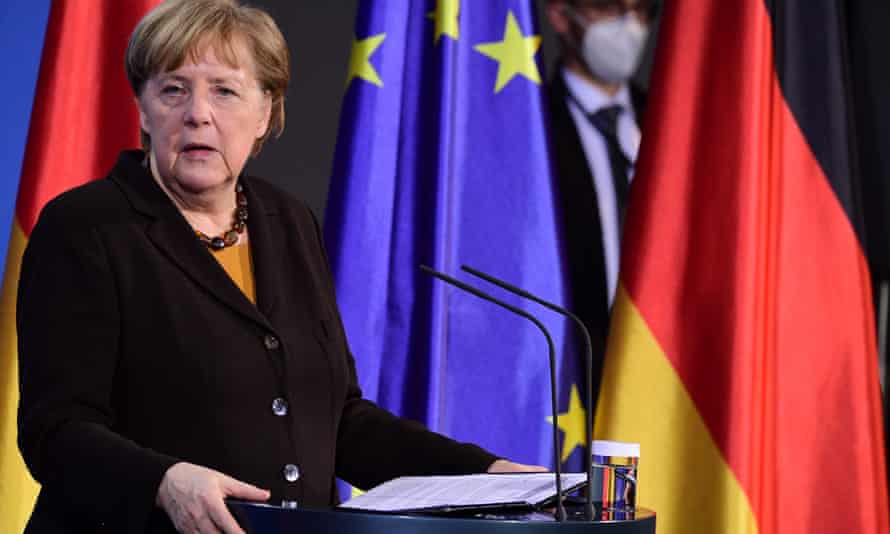Calls are growing in Germany for the introduction of nationwide coronavirus restrictions amid confusion and frustration over patchwork arrangements across the country as the infection rate continues to rise.
The majority of Germans are in favour of a more unified approach to tackling the virus, now in its third wave, according to a poll, ahead of an expected tightening of rules after the holiday weekend.
Fifty-three per cent of Germans have said they would like to see the government setting the rules without the support of the 16 states, according to a poll by YouGov, in order to introduce more clarity.
The chancellor, Angela Merkel, has persistently called for tighter, more unified rules across the country, but has frequently been overruled by the leaders of the states, leading to a weakening of her standing.
The Interior minister, Horst Seehofer, said a nationwide approach was the only way for the country to effectively fight the virus’s spread.
“There is a great desire among the population for unified rules,” he told the newspaper Welt am Sontag. “Therefore my proposal is to establish uniform rules with a federal law … which would prescribe which measures have to be taken according to the incidence value”.
A lag in reporting new infections over the holiday period is thought to be the reason for an apparent fall in the number of incidents. The Robert Koch Institute said Monday’s figure – 8,500 new infections, about 1,400 less than a week ago, was likely to be higher in reality due to the ‘Easter effect’, which meant fewer people were being tested. Fifty deaths were also reported.
More than 4,100 patients with coronavirus, the highest figure since the start of February, are being treated in intensive care, 55 per cent of whom are on ventilators. During the pandemic, the highest level of patients admitted to ICU so far was at the start of January. More than 4,600 ICU beds remain unoccupied.
While there is broad agreement that certain restrictions should be determined according to regional infection rates, the glaring contrast between people in Hamburg facing a night-time curfew since Friday at the same time as 60 to 70 planes a day transported an estimated 40,000 holidaymakers to the Spanish island of Mallorca has led to a sense of unrest, impatience and anger.
Reports over the weekend of Germans basking in temperatures of C20 on Mallorca’s beaches, while those who stayed at home faced an icy polar front and snowstorms, has only added to the disgruntlement.
Some politicians have even called for a delay to the summer holiday after it was suggested last week tight restrictions might remain in place until August.
Merkel criticised the patchwork approach to restrictions last week, saying she was not prepared to “stand by and watch infections rise to 100,000 a day”.
It is widely expected that after the Easter break Merkel is likely to seek to push through some of Germany’s harshest lockdown conditions yet, including night-time curfews, a reduction in permitted contacts, and an obligation on companies to test their workers or face temporary closure.
It has even been mooted by some decision-makers that Germany may have to consider closing schools and kindergartens, which reopened on 8 March in a strict shift pattern, and replacing A-level equivalent exams with teacher assessment.
A rigorous twice-weekly testing regime in schools due to be introduced before Easter has yet to be realised.
Germany’s health minister, Jens Spahn, promised at the weekend that the country’s sluggish vaccine programme will receive a boost later this month with a rise in the number of deliveries of doses, which he expected would lead to 20% of citizens having received their first inoculation by the start of May.
Calling the rise in the number of patients in ICU “alarming”, during a visit to a vaccine centre in Berlin on Monday he said the vaccine campaign was not capable of breaking the third wave, only a reduction in contacts, “mostly in private, in schools, at work, wherever we can”.

The introduction of vaccinating in 35,000 doctors’ practices after Easter is expected to improve efficiency. A pilot project in the state of Saarland, where the military is running a 24hour vaccine centre, might yet be copied across the country.
So far, 12& of Germans have received a first jab, and just over 5% are fully vaccinated.
The German government has for the first time started talking concretely of a correlation between being vaccinated and being granted more freedom to return to a pre Covid-19 lifestyle, after data gathered by the RKI indicating that vaccinated people were unlikely to contribute to transmission.
Spahn said on Sunday that “people who are fully vaccinated will in future be able to be treated the same as someone who has a negative test result.”
Gerd Landsberg, the head of the German Association of Towns and Municipalities, welcomed the announcement, saying he expected it would increase people’s willingness to be vaccinated.
“If it can be ascertained that those who have already been vaccinated can no longer be contagious, they should be excluded from the necessary measures, such as having to have a test before they go shopping or visit a restaurant,” Landsberg told the Funke Mediengruppe. “This would also considerably add to the incentive to get vaccinated,” he said.
This content first appear on the guardian
